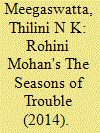| Srl | Item |
| 1 |
ID:
159391


|
|
|
|
|
| Summary/Abstract |
The literary corpus of the sixteenth-century North Indian bhakti poet-saint Mirabai has grown over time as devotees have used (and continue to use) her name, life story and first-person voice in poems. Drawing on hagiographies, written and oral poems, printed collections and performative engagements with Mira, I argue that these moments of autobiographical ‘posing’ reveal autobiography as powerful for speaking about religious transformation, in particular the issues of authority, experience and critique. Furthermore, the centrality of autobiographical speech in the tradition is linked to an increasing emphasis on Mira as a figure of religious transformation, and bhakti itself as a transformative path.
|
|
|
|
|
|
|
|
|
|
|
|
|
|
|
|
| 2 |
ID:
186308


|
|
|
|
|
| Summary/Abstract |
The protracted armed conflict in Sri Lanka (1983–2009) has had a significant impact on the social fabric of the country. The Tamil community – the women especially – bore the brunt of the traumatic spill-over of decades of warfare that brutalised all areas of life, especially in the North. With the belief that narrative literature on war captures the complex ways in which gender, war, and peace interact and impact configurations of the female gender in turbulent war-torn and post-war societies, this paper critically reads Rohini Mohan's The Seasons of Trouble (2014), a non-fiction narrative of the life stories of three individuals that lay claim to ‘truth’ and therefore is placed in a strong position in relation to collective memory, archive, and history. The critical content analysis from a feminist theoretical standpoint conveys how the trajectories of Tamil women caught in Sri Lanka's war shine a light on the ways in which dominant configurations of war and peace construct the female gender identity in specific ways and thereby shape the way women are framed in war-torn and post-war societies with tangible implications on the lived realities of Tamil women in Sri Lanka.
|
|
|
|
|
|
|
|
|
|
|
|
|
|
|
|